Let this mind be in you, which was also in Christ Jesus: Who, being in the form of God, thought it not robbery to be equal with God: But made himself of no reputation, and took upon him the form of a servant, and was made in the likeness of men: And being found in fashion as a man, he humbled himself, and became obedient unto death, even the death of the cross. Wherefore God also hath highly exalted him, and given him a name which is above every name: That at the name of Jesus every knee should bow, of things in heaven, and things in earth, and things under the earth; And that every tongue should confess that Jesus Christ is Lord, to the glory of God the Father.
—the apostle Paul to the Philippian Christians in Philippians 2:5-11 (KJV)—
When America was in the throes of the Great Depression, two high school students in Cleveland, Ohio, Jerry Siegel and Joe Shuster, struck up a friendship. Both were sons of Jewish immigrants. They met in 1931. Both young men were shy, each with a tendency to keep to himself. But they shared an interest in adventure stories, science fiction, and comic strips. Jerry was a writer and Joe an artist—and they loved talking about ideas for adventure stories, developing plot lines, and then putting it all on paper in comic book form.

In 1932, Jerry and Joe designed a periodical and made it available to subscribers. They called it Science Fiction. In early 1933, the periodical carried a story called “The Reign of the Superman.” In the story line, a madman attempts to rule the world with his telepathic powers. The term Superman was taken from the German term “Übermensch,” which Friedrich Nietzsche had coined in 1883 to refer to the state he believed men might attain.
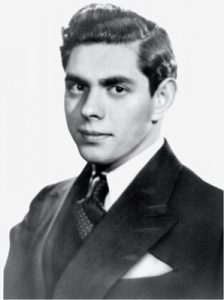
After the release of their story, Jerry began to rethink his idea. What if Superman were an influence for good rather than evil? And what if his abilities weren’t primarily telepathic, but physical? During a hot summer night, the two young men brainstormed together. Joe would draw images representing Jerry’s ideas as Jerry formulated them. And in the coming weeks, they fleshed out and refined the details of their concept. The main character would come to earth from a distant planet and adopt earth as his home. He would be a force for good, but he would use his powers only as Superman—and disguise himself at other times as his alter ego, a shy newspaper reporter named Clark Kent.
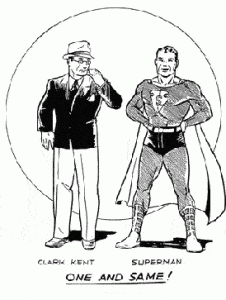
Jerry and Joe submitted their proposal for a comic book/comic strip superhero repeatedly—and were repeatedly turned down. Nevertheless, they began to do comic book work for National Allied Publications, from which DC comics later would emerge. Then, in 1938, an editor chose Jerry and Joe’s Superman proposal for the first issue of Action Comics.
In Spring 1938 when Action Comics #1 was released, the typical American worker was earning less than twenty-five dollars each week. For ten cents, readers could purchase a 68-page magazine with a full color cover that featured Superman lifting an automobile. He didn’t fly in that issue but would jump from one high rise building to another. Nor was he as strong as he would become in ensuing years. Yet his attitude and approach to life resonated with readers. He looked out for and defended the “little guy” against bullies of all types—not just criminals.
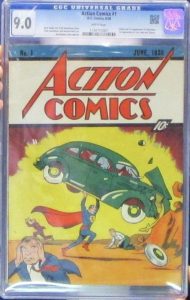
Action Comics became a publishing success story. In the year that followed the release of the first issue, Superman became very popular with the public. Just what was it about Superman that proved to be such a draw? Observers have noted that through the years, Superman’s popularity hasn’t been rooted merely in his super powers—but these, coupled with the reserved nature of Superman’s alter ego, Clark Kent, struck a chord. In the documentary titled Look, Up In the Sky! The Amazing Story of Superman (Warner Home Video, 2006), experts offered some insightful observations.
One said, “Superman established the idea of somebody who seems to be a meek, ordinary, average person, and is really a superhero, and it was a formula that virtually every superhero owes a debt to, even today.”
Another stated, “It’s not the ‘Übermensch’; it’s not the Germanic idea of the Superman, the superior man of Nietzsche. This is the greatness of the meek, the mild.”
This is the greatness of the meek, the mild.
—an observer on the popularity of Superman—
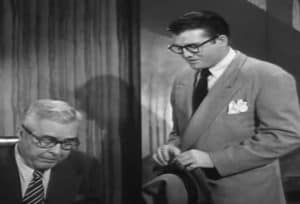
Thus, we see that the core quality of strength under control is like a magnet that attracts people! While we all know individuals who illustrate this principle with their lives, Superman’s popularity is a vivid, easy-to-understand example showcasing this truth. People were not—nor have they ever been—drawn to him only because he possesses great strength, ability, and power; it’s also that he is gentle, a defender of the weak, a spokesman for what is right and good.
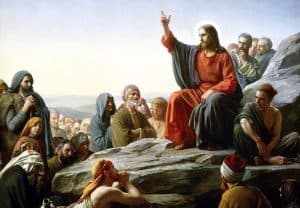
We are reminded of these realities as we read Jesus’ words in Matthew 5:1-16—perhaps especially His words in verse 5: “Blessed are the meek: for they shall inherit the earth.” Some have contended, “If the meek are going to inherit the earth,they’re going to have to become a lot more aggressive!” These folks simply don’t understand the true concept of meekness.
Nor do they understand the meaning of the word inherit. That word means “to receive that which is assigned to one; to become a partaker in.”

Obviously, Superman is fictional—but don’t he and the story of his popularity illustrate that the core themes Jesus touched on in the Beatitudes resonate deeply in the human soul? Jesus knew what He was talking about when He spoke of godly qualities that not only never run roughshod over people, but that also defend against oppressors and uphold God’s servanthood values in a basically self-centered world.*
Jesus didn’t just talk about these qualities—He demonstrated them in His own life. Check out John 4:1-30,39-42 where, of all things, Jesus actually talked with a Samaritan—and a Samaritan woman at that! Religious leaders of the day were aghast at Jesus’ associations with tax collectors and sinners (see Matt. 9:10-12; 11:19; Luke 19:1-11). However, these outcasts gathered around Him, hanging on His every word (see Luke 15:1). We don’t have to wonder why!
He healed the sick, showed concern for those who had lost their way morally and spiritually, and welcomed children into His presence. (see Luke 4:40; 18:15-17; John 8:1-11). Lepers were clear outcasts in Jesus’ day; but the Lord not only had compassion on them, He also healed them (see Luke 7:22; 17:11-19).
And He who was a defender of outcasts became the ultimate outcast Himself. He was falsely accused of wrongdoing, mocked, spat on, whipped mercilessly, and condemned to die on a cross as a common criminal (see Matt 26:59-68; 27:1-50).
We’ve seen the character of Superman resonates with people; he has a very broad appeal. In the world of fiction, he is the ultimate immigrant. Gentle but strong, he is a defender of the weak and powerless.
Yet, in the real world, Jesus Himself is the real Superman. From heaven He came into the world as a helpless baby—and He was rejected by most of the people He came to redeem (see John 1:10-12). Still, He loved them and served them. Let me tell you, it took supernatural strength to be able to pray from the cross, “Father, forgive them; for they know not what they do” (Luke 23:34). And it took supernatural power to die for sinners as well (see Matt. 26:36-44).

Jesus did die for you and for me—and He rose again. And that same power that raised Him from the dead is available to help us, his followers, live supernatural lives (see Eph. 1:19-23).
We, too, can be gentle but strong—not like the fictional Superman created by Jerry Siegel and Joe Shuster, but like the real Superman—I call Him that reverently—the Son of Man and the Son of God, Jesus Christ, the One who declared boldly that the meek would inherit the earth.
Written by B. Nathaniel Sullivan, this article initially appeared in the Fall 2012 issue of Life Words Leader Guide, (Nashville: LifeWay Christian Resources, 2012), 62, 148-149. Copyright © 2012 by LifeWay Christian Resources. All rights reserved. Used by permission.
*This is not an affirmation of social justice or its tenets, but of authentic servanthood as exemplified in Jesus’ own life and ministry.
Permission from LifeWay Christian Resources for the author to publish this article at www.wordfoundations.com should not be construed as an endorsement of this website by LifeWay.
top image credit: Lightstock
image credit: Action Comics #1
Sources:
http://en.wikipedia.org/wiki/Joe_Shuster
http://en.wikipedia.org/wiki/Jerry_Siegel
http://en.wikipedia.org/wiki/Superman
Look, Up In the Sky! The Amazing Story of Superman (Warner Home Video, 2006)

Be First to Comment